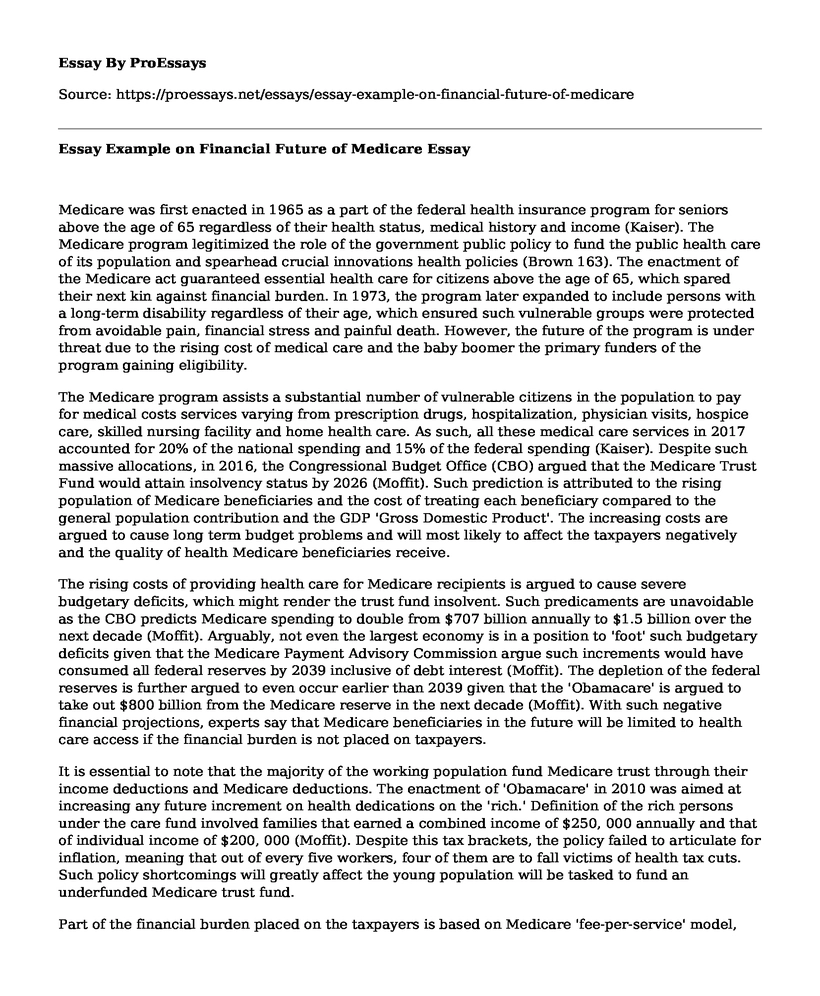Medicare was first enacted in 1965 as a part of the federal health insurance program for seniors above the age of 65 regardless of their health status, medical history and income (Kaiser). The Medicare program legitimized the role of the government public policy to fund the public health care of its population and spearhead crucial innovations health policies (Brown 163). The enactment of the Medicare act guaranteed essential health care for citizens above the age of 65, which spared their next kin against financial burden. In 1973, the program later expanded to include persons with a long-term disability regardless of their age, which ensured such vulnerable groups were protected from avoidable pain, financial stress and painful death. However, the future of the program is under threat due to the rising cost of medical care and the baby boomer the primary funders of the program gaining eligibility.
The Medicare program assists a substantial number of vulnerable citizens in the population to pay for medical costs services varying from prescription drugs, hospitalization, physician visits, hospice care, skilled nursing facility and home health care. As such, all these medical care services in 2017 accounted for 20% of the national spending and 15% of the federal spending (Kaiser). Despite such massive allocations, in 2016, the Congressional Budget Office (CBO) argued that the Medicare Trust Fund would attain insolvency status by 2026 (Moffit). Such prediction is attributed to the rising population of Medicare beneficiaries and the cost of treating each beneficiary compared to the general population contribution and the GDP 'Gross Domestic Product'. The increasing costs are argued to cause long term budget problems and will most likely to affect the taxpayers negatively and the quality of health Medicare beneficiaries receive.
The rising costs of providing health care for Medicare recipients is argued to cause severe budgetary deficits, which might render the trust fund insolvent. Such predicaments are unavoidable as the CBO predicts Medicare spending to double from $707 billion annually to $1.5 billion over the next decade (Moffit). Arguably, not even the largest economy is in a position to 'foot' such budgetary deficits given that the Medicare Payment Advisory Commission argue such increments would have consumed all federal reserves by 2039 inclusive of debt interest (Moffit). The depletion of the federal reserves is further argued to even occur earlier than 2039 given that the 'Obamacare' is argued to take out $800 billion from the Medicare reserve in the next decade (Moffit). With such negative financial projections, experts say that Medicare beneficiaries in the future will be limited to health care access if the financial burden is not placed on taxpayers.
It is essential to note that the majority of the working population fund Medicare trust through their income deductions and Medicare deductions. The enactment of 'Obamacare' in 2010 was aimed at increasing any future increment on health dedications on the 'rich.' Definition of the rich persons under the care fund involved families that earned a combined income of $250, 000 annually and that of individual income of $200, 000 (Moffit). Despite this tax brackets, the policy failed to articulate for inflation, meaning that out of every five workers, four of them are to fall victims of health tax cuts. Such policy shortcomings will greatly affect the young population will be tasked to fund an underfunded Medicare trust fund.
Part of the financial burden placed on the taxpayers is based on Medicare 'fee-per-service' model, which in expert laymen language means the more services rendered to patients, the more services charged (Minarik). With no proper control in this system, physicians and facilities are justified to send a bill to the taxpayers provided, there is an incentive that benefits a Medicare patient. As such, a "capitated prepayment" system has been suggested as an alternative model where an insurance company has its facilities and team of doctors and physicians under contract. The alternative model utilizes medical personnel under contract in that there is no additional cost is billed whenever an individual service is added to the treatment. This eliminates the incentive to charge on any additional service offered for the benefit of the patient since they are salaried employees.
Cite this page
Essay Example on Financial Future of Medicare. (2023, Jan 29). Retrieved from https://proessays.net/essays/essay-example-on-financial-future-of-medicare
If you are the original author of this essay and no longer wish to have it published on the ProEssays website, please click below to request its removal:
- Nurses' Knowledge and Attitudes About Pain Essay
- How Medical Marijuana Operates in Chemotherapy Patients? - Paper Example
- Article Analysis Essay on "Accidents on the Road"
- Essay Sample on Nurses in New Jersey: Quality Healthcare Services for the Public
- Essay Sample on Cigarette Smoking: Leading Cause of Death & Disease in USA & World
- Gaining Legal Competency Through Paternity Fraud Cases: A Reflection - Essay Sample
- Nurse's Action on Low Oxygen Saturation in Patients - Essay Sample







